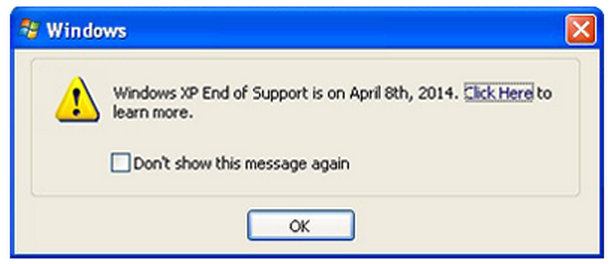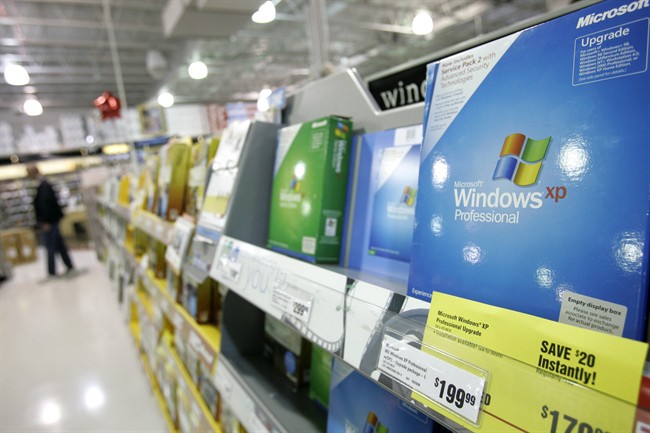TORONTO – Microsoft is ending support for Windows XP 12 years after its release.

As of April 8, the U.S.-based technology giant will no longer offer technical support or security updates for machines running the operating system, which still ranks as the second-most popular OS in the world.

Computers running Windows XP will still work after Tuesday – but there will be no Microsoft tech support for customers experiencing software issues.
But security updates, usually released by Microsoft every month, will no longer be issued – leaving any undiscovered security flaws open for hackers to exploit. This means users will be left vulnerable to viruses and malware that could put their information at risk.
“Cyber criminals are going to be very intent on exploiting whatever vulnerabilities they have managed to identify,” Stefano Tiranardi, information protection specialist at Symantec Canada, told Global News.
“Some are probably going to be reverse-engineering vulnerabilities they have found on the newer operating system to see if they can apply them to Windows XP platforms because Microsoft won’t be protecting those anymore.”
- Canadian man dies during Texas Ironman event. His widow wants answers as to why
- ‘Shock and disbelief’ after Manitoba school trustee’s Indigenous comments
- Several baby products have been recalled by Health Canada. Here’s the list
- ‘Sciatica was gone’: hospital performs robot-assisted spinal surgery in Canadian first
What does this mean for the average user?
Microsoft has been warning users and businesses of XP’s end of life for years, providing a good platform for the company to encourage users to upgrade to Windows 8 or invest in new machines.
But many consumers have shown a reluctance to switch. Windows XP still holds 27 per cent of operating system market share.
Tiranardi said in his experience, consumers are reluctant to upgrade because Windows XP still works well and newer systems don’t offer enough new features to justify the price tag.
“People are weighing the cost against what else they would get, against keeping up with the neighbours,” he said.
READ MORE: Microsoft touching up Windows 8 to address gripes
XP users may also experience performance issues, especially the longer they use the outdated OS without any software updates. Some PCs, especially older ones, may become prone to freezing and crashing. New software and computer accessories may not work with the older software.
According to one software security firm, Windows XP users will be six times more likely to fall victim to malware attacks than Windows 7 users.
But Tiranardi argues that some users won’t be as cognizant of the security risks because they haven’t kept up to date with their computer security to begin with.
“On the consumer side, their risk level is not going to be dramatically impacted – for the simple reason that the majority of consumers are historically not very good at applying the patches even when Microsoft made them available,” he said.
“They were already extremely vulnerable because they didn’t have very good maintenance programs with their own machines.”
What can users do to protect themselves?
If users still aren’t willing to upgrade their computers to Windows 7 or 8, or buy a new machine right away, there still are ways to protect against viruses.
Microsoft will still provide updates for its free anti-malware software called ‘Microsoft Security Essentials’ until July 2015, but the company warns it will offer limited protection.
XP users can also protect their machines with third-party anti-virus software.
Microsoft has cautioned that anti-malware solutions for outdated operating systems are limited, but Tiranardi believes that software security firms will continue to offer support until the majority of consumers decide to upgrade.
Thomas Dean, associate professor of electrical and computer engineering at Queens University, notes that users should keep in mind the delay between when a virus comes out and anti-virus software that can actually detect it.
But Dean notes that home users are still taking risks by just using anti-virus software, especially when doing things like online banking.
Enterprise, small businesses affected too
Many corporate and small businesses still use XP for a number of systems including point-of-sale systems and sale and shop floor data collectors.
In fact, 95 per cent of the world’s ATMs still use XP, according to Symantec.
This also affects consumers who use these businesses.
“Just like using an outdated medication is not the best practice, using an unsupported operating system to run your financial transactions through probably [isn’t either],” said Tiranardi.
But consumers can seek comfort in the fact that businesses are traditionally better at deploying security patches than the average home user, the security expert added.
Many corporate businesses are also likely to seek additional security support, which companies can still purchase from Microsoft and other security software providers.
READ MORE: Smartphone app that allows credit card skimming ‘real risk’ to consumers
Dean added that Canadians can also rest easy knowing that the majority of businesses allow users to pay with chip-card technology – which is more secure than just using the magnetic stripe on a credit or debit card.
“In Canada most banks have moved to chip cards which establish a secure connection right to the bank, which means that the information isn’t available to the point-of-sale system,” Dean said.




Comments